News & Media
Unisa has a bold vision for the next 150 years and beyond
On Friday 16 February 2024, Unisans descended on the main campus in their numbers for the Official Opening Ceremony of the 2024 Academic Year, themed Reclaiming Africa’s intellectual futures into the next 150 years and beyond.
Click here to view a recording of the ceremony.
A major highlight on Unisa’s annual calendar, the Official Opening Ceremony presents a unique opportunity for the university to rededicate, renew and reaffirm its commitment to continuous improvement in the ever-evolving higher education landscape. This year, it was also to be a moment of appreciation for and farewell to the outgoing Chair of Council, James Maboa.
The ceremony coincided with the culmination of Unisa's 150th anniversary celebrations and the momentous occasion of the 30th anniversary of our country’s democracy.
Greener pastures lying ahead
In her opening address, Unisa Principal and Vice-Chancellor (VC), Prof Puleng LenkaBula, stated that the academic opening serves as a reminder that Unisa is dedicated to the continuation of its core business in pursuit of being the African university shaping futures in the service of humanity, and attentive to the ecological and climatic challenges that bedevil the world today.
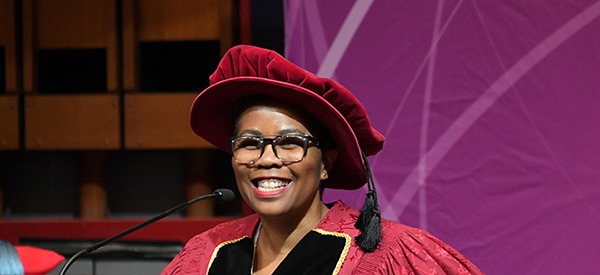
Unisa Principal and Vice-Chancellor, Prof Puleng LenkaBula
The VC lauded the late Nelson Mandela for being the first post-apartheid president of the country, who ushered in the dawn of democracy. She stated: "30 years ago, the late President Mandela, an esteemed alumnus of Unisa, ushered in the new South Africa as the first democratically elected president of the country, and for that we are eternally grateful."
The VC stated that 20 years ago, Unisa and Technikon South Africa merged to create a dedicated, comprehensive, open distance and e-learning university. She continued: "We celebrate this merger in our hearts." The VC said that the university now serves as the leading platform for public deliberations in the country.
Reflecting on Unisa’s duty as a societal citizen, the VC said: "I want us to never be attentive to only our challenges as an institution. We will fail dismally. We should ask the question: how are we going to rally together to ensure that the benefits and dividends of the 30 years of democracy and freedom are manifest for all, and that education, research, engaged scholarship and academic citizenship become important?"
She continued: "We must consolidate the societal engagements and create dialogical and research arenas that have global impact. Whereas we acknowledge that some of the fault lines of our societies in the aftermath of democracy require our attention as a university, we should be proud that since the democratic dispensation, we have established a constitutional democracy, a reformed public service, the right to vote for the government of one’s choice, the recognition of women’s rights, equal access for people living with disabilities, and basic services such as health care and education. We should be excited that our scholarship impacts this change."
In conclusion, the VC dedicated a passage from Keorapetse Kgositsile’s poem, No Boundaries, in which she motivated the audience to keep moving forward to a landscape where dreams cannot be turned into nightmares.
A resilient university
Maboa reflected on departing from his position as Council Chairperson. He summed up his tenure at the helm as momentous and worth celebrating.
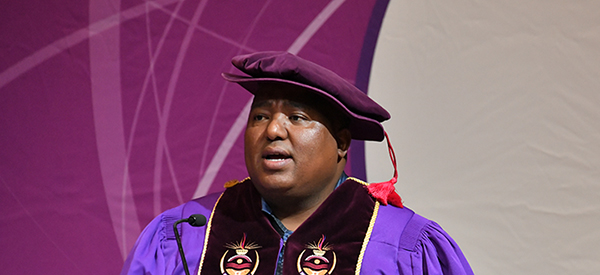
Outgoing Chair of Council, James Maboa
Maboa stated that during his tenure, the university witnessed fruitful events, which included Unisa’s rise in global university rankings, and a plethora of accolades won by academics such as the South African Women in Science Awards, the National Research Foundation-South African Agency for Science and Technology Advancement’s (NRF-SAASTA) FameLab Competition, and the Emerald Literati Awards.
Maboa congratulated the university’s management for the first-of-its-kind multi-year wage agreement signed between the university and its recognised labour unions. These achievements, he stated, are the result of collective hard work, dedication and commitment to the university.
Maboa recounted that such achievements were earned against the backdrop of many challenges faced by the university, in addition to being cast in a negative light by the media. "Our collective resilience against these attacks has, however, enabled us to weather the storms," he asserted.
Maboa extended his sincerest thanks to his Deputy and Chairperson-Elect, Dr Dan Mosia, the entire Council, past and present, and the extended management, for their support during his tenure. "I am leaving behind an army of committed and loyal servants of the university of the land, in whose hands the future of this university is safe," he concluded.
30 years of transformation
"The academic opening not only occurs at the height of the university’s 150th anniversary celebrations, but also when the country is celebrating 30 years of freedom and democracy," said Mosia, in his maiden speech as Council Chairperson. He said that the celebration of the national milestone reflects the strides made in the last three decades of democratic rule, during which, he said, the country has been transformed significantly in the areas of health, education, business participation, infrastructure expansion, employment equity, and both rural and urban development, among others.
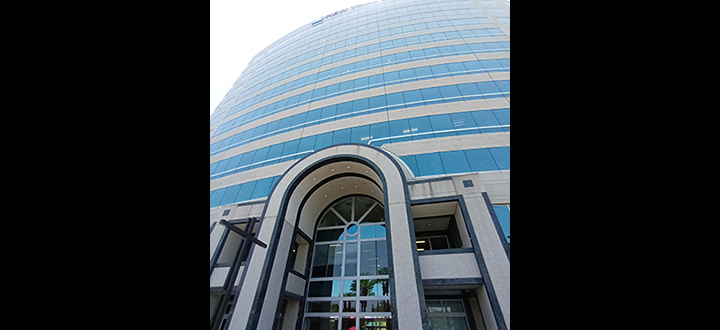
Chair-Elect of Council, Dr Dan Mosia
"The country is no longer the same since the advent of democratic rule in 1994," said Mosia. He stated that the higher education sphere and the expansion of the requisite education infrastructure, increasing access to those who previously did not enjoy the right to quality education, and the expansion of the state’s financial support through measures such as the National Student Financial Aid Scheme (NSFAS), are some of the tangible gains of democracy.
In conclusion, Mosia thanked Maboa for his service and insights. He stated: "In all your ways, you have left an indelible mark."
The thinking African
In his closing address, Unisa Chancellor and Former South African President, His Excellency Dr Thabo Mbeki, shared his message of condolences to the citizens of Namibia on the passing of their President, His Excellency Dr Hage Gottfried Geingob, who succumbed to cancer on 4 February.
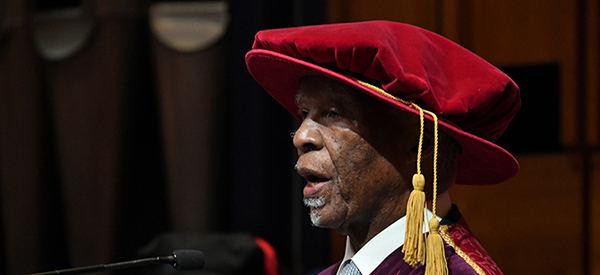
Unisa Chancellor and former President of South Africa, His Excellency Dr Thabo Mbeki
Mbeki expressed dismay while recollecting some of the passages of the book Can Asians Think? by Kishore Mahbubani, which, he said, suggest that Africans cannot think. He continued: "I would like Maboa to write a book titled Can Africans Think?. We need answers to this question. and this university is well placed to answer that question practically, by the quality of our students, research, and new knowledge, and through being the centre of excellence."
In conclusion, the Chancellor said: "As we formally commence with the 2024 academic year, I wish the best to both staff and students. We must try to make sure that this year proves a point; that the African can think, and to shame all of those who thought they have the power and the right to put the university under administration."
* By Godfrey Madibane, Acting Journalist, Department of Institutional Advancement
** Photography by the Unisa Multimedia Centre
Publish date: 2024/02/16
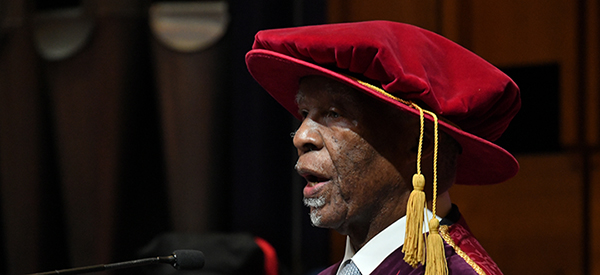

 Unisa co-hosts G20 community outreach in the Eastern Cape
Unisa co-hosts G20 community outreach in the Eastern Cape
 Unisans gain membership of prestigious science academies
Unisans gain membership of prestigious science academies
 Advocating for disability transformation through servant leadership
Advocating for disability transformation through servant leadership
 Unisa Press continues to illuminate the publishing space
Unisa Press continues to illuminate the publishing space